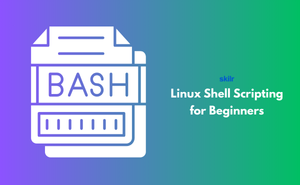👇 CELEBRATE CLOUD SECURITY DAY 👇
00
HOURS
00
MINUTES
00
SECONDS

Learning Linux Shell Scripting for Beginners means starting with the fundamentals of writing scripts that automate everyday activities on Linux. A shell script is like a set of instructions that tells the computer what to do, saving users from repeating tasks manually. It’s a simple yet powerful tool that helps even newcomers manage their systems with ease.
This beginner-friendly approach introduces essential scripting concepts such as using variables, reading inputs, controlling processes, and working with files. It’s designed to give learners a solid foundation so they can start building their own automation tools and progress to more advanced Linux scripting skills later.
This exam is ideal for:
Domain 1 - Introduction to Shell Scripting
Domain 2 - Writing Your First Script
Domain 3 - Variables and User Input
Domain 4 - Basic Control Structures
Domain 5 - Working with Files and Directories
Domain 6 - Functions for Beginners
Domain 7 - Processes and Jobs
Domain 8 - Debugging Basics
Industry-endorsed certificates to strengthen your career profile.
Start learning immediately with digital materials, no delays.
Practice until you’re fully confident, at no additional charge.
Study anytime, anywhere, on laptop, tablet, or smartphone.
Courses and practice exams developed by qualified professionals.
Support available round the clock whenever you need help.
Easy-to-follow content with practice exams and assessments.
Join a global community of professionals advancing their skills.
Mostly Bash, as it’s the most common.
Roles in system administration, DevOps, IT support, and cloud computing.
It automates repetitive work, saving time and effort.
No, shell scripting is often the first step before learning other languages.
Absolutely, scripting is a key DevOps skill.
Yes, most scripts work on all distributions with little or no changes.
Yes, basics like loops, conditions, and functions are introduced.
File handling, backups, monitoring, and system navigation.
Not at all – it starts simple and grows with practice.
Yes, it makes you more efficient in handling Linux systems.
No, even students and hobbyists can benefit from it.
It saves time, reduces repetition, and builds a foundation for advanced Linux skills.
A shell script is a file containing commands that the computer runs automatically.
It’s an introduction to writing scripts to automate tasks in Linux.
No, only basic Linux commands are needed.